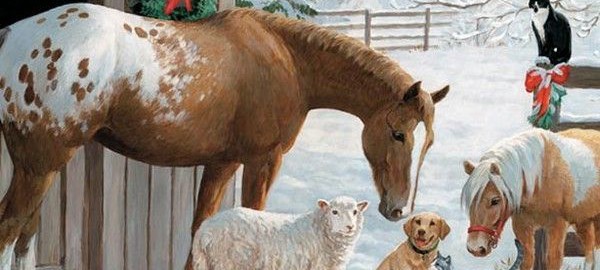There is a Norwegian story about the birth of Jesus in the stable in Bethlehem, that claims that the animals in the stable watched the birth and then they began to praise God for what they had just seen. Apparently this went on before the shepherds came on the scene. When the shepherds appeared the animals fell silent. The only ones purported to hear the animals were Mary, Joseph and the Christ child. (Originally published December 24, 2015)
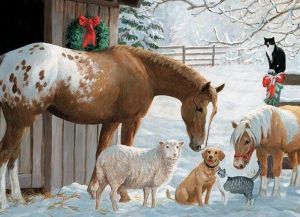
I didn’t know about this story until I got a young mare who was born on Christmas Eve, and I was told by her previous owner that she was born on “the night the animals talk.”
I have found this mare to be particularly talkative in pictures, actions and impressions mostly. Since then, other horses have also been much more open in their conversations with me. In fact, I think all animals are talking a good deal of the time, not waiting for a Christ child to be born for the opportunity.
As I’m not particularly religious, but do tend toward spirituality, as there is more and more evidence to suggest we have a closer relationship wit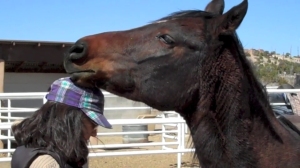 h animals than we might at first think.
h animals than we might at first think.
When animals lived in closer quarters with people, I think these incidents may have been more commonplace. People understood the rhythms of the earth and the animals better, and there was less of a division between the unspoken world and the spoken world, the felt and the unfelt, the seen and the unseen. The “Winter Solstice” was more important because it signaled a change in sunlight, from dark to light, gave valuable information about the growing season and phases of the sun and moon. A reliance on intuition and feeling plus indicators from the earth and sky took care of more than in today’s world, where we have precision farming and cell phones and other devices to monitor our lives and keep us far from nature.
You could ask, were the animals speaking human language? Were they braying, neighing and bleating? It really doesn’t matter what their language was; to me it is important  enough that they recognized something worth talking about. And the people there recognized it too. What I might like to know is, what were they saying?
enough that they recognized something worth talking about. And the people there recognized it too. What I might like to know is, what were they saying?
So much of what a horse “says” or tries to communicate can go unsaid. I would guess that before I became aware of this, much of what horses tried to communicate to me went unheard. Horses will not show much to those who can’t listen, they will just react. For those who simply think of horses as livestock, they may not receive these pearls of wisdom.
On the other hand, some horses will recognize opportunities to communicate, with owners who communicate best from the saddle, in beautiful moves and subtle gestures.
When horses talk to each other, this language sustains them and allows them to negotiate their environment. Where someone is standing, who gets to eat where, when behavior is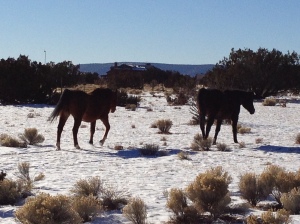 not tolerated, whose hay is that, are all areas that the horse needs to negotiate hundreds of times on a daily basis. It may seem monotonous to watch horses but this is what they do and what is important to them. When we enter the space and have another agenda, it is no wonder sometimes they aren’t on the same page with us!
not tolerated, whose hay is that, are all areas that the horse needs to negotiate hundreds of times on a daily basis. It may seem monotonous to watch horses but this is what they do and what is important to them. When we enter the space and have another agenda, it is no wonder sometimes they aren’t on the same page with us!
We haven’t been living in the pasture, we haven’t been sharing the shelter. It would be like an intruder coming in and expecting dinner to be ready, or to be able to sit in the master’s most comfortable chair.
The other day I came in wanting to rub Patches down with a fleece blanket because he had run around and gotten all sweaty with his long winter coat. I was worried he might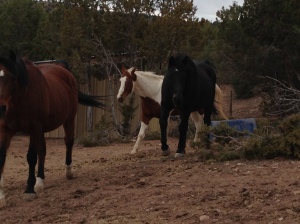 catch cold, and the worry, I felt was not unwarranted, since he has had pneumonia before. But he would have none of it, and my mare Jazzie “hid” him behind her, forming a formidable wall between him and me!
catch cold, and the worry, I felt was not unwarranted, since he has had pneumonia before. But he would have none of it, and my mare Jazzie “hid” him behind her, forming a formidable wall between him and me!
Were words necessary in this case? I’d say not, the actions of those horses spoke louder than words. It’s not like she could exactly hide a big spotted horse who easily towered over her but she made her point. And because they live in the moment, the next day when I wanted to brush them, all was forgotten and everyone was happy with the attention.
If we make ourselves part of the herd experience, we then are part of everything. Sometimes we must step out of that role to ask some human thing, like stick your nose in the halter, or wear a saddle, but then it should just be part of the whole process. There are exceptions of course, like me with my fleece blanket (which I did get to use, after all!), but then I have to also consider – what was my energy like when I came at him with that big green floppy thing? It was so important to me, that I think in some way I may have left him out of the equation. There will be times like this, when you must administer medicine, you need to take some action that the horse isn’t going to like. In retrospect, I would suggest the consideration of the horse’s feelings about it, but that you’re going to need to do this anyway. In a way you might have to do with a child who doesn’t understand the consequences of not wearing a jacket outside when the weather is below freezing, or taking care of a fever.
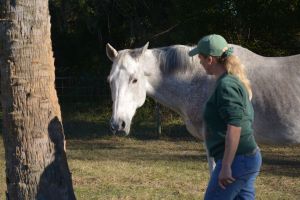
Our ability to communicate outside our own species is cause for celebration in itself, and doesn’t have to herald a huge world event. I think that it helps us to communicate with people because we are thinking outside the box, we are feeling things that we aren’t so able to feel in daily life.
So enjoy Christmas Eve. And remember and open your ears to “the night the animals talk,” and let me know if you hear them!
Copyright (c) Susan Smith
****
Articles in Horse Around New Mexico



Professional Services include:
Bodywork: (Ortho-Bionomy for people, Equine Ortho-Bionomy, Equine Positional Release (EPR)): private sessions, tutorials, phone consultations, Horse & Rider sessions, Equine Body Balance.
Distance Healing Communication
Gift certificates
Ask about The Equine Body instruction & curriculum!
Liberty Coaching:
Clinics, mini-clinics, workshops,
Private and semi-private sessions, tutorials
Consultations: by appointment: 505.501.2478 or emailing susansmith@orthohorse.info Contact me for details.
Let me know if you want to do a clinic in your area. Scheduling now for 2016. Prices will vary according to location & travel costs.
Equine Body Balance Study Group 2-3 hours. January 9th 12 – 3 p.m. Arrowhead Ranch. $75.
January 30-31, 2016 (Note Date Change!) — Weekend Liberty Foundations Clinic in DeLand, Florida at Curly Dee Ranch. Early Bird sign up: $350 by January 2. After that date, $375.
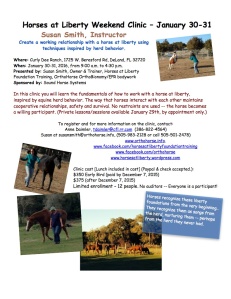
Please see http://www.naturalwhisperings.com for Clinics in the Portland, Oregon area June and August 2016!



